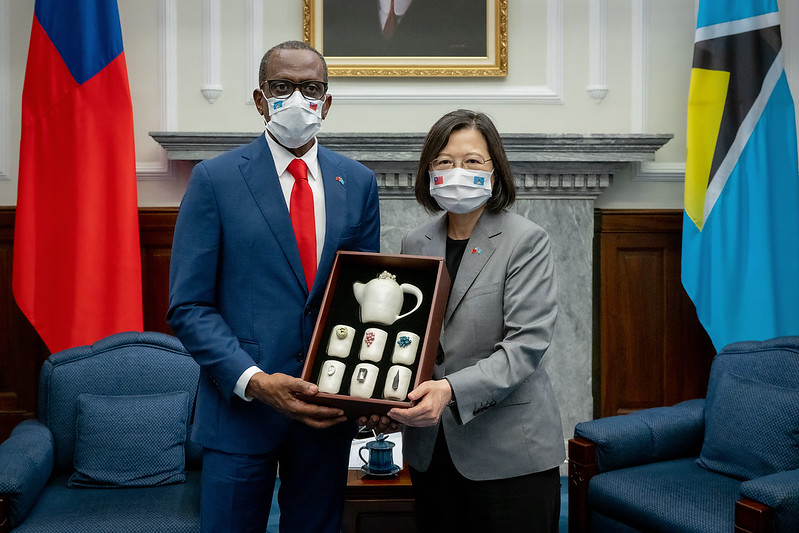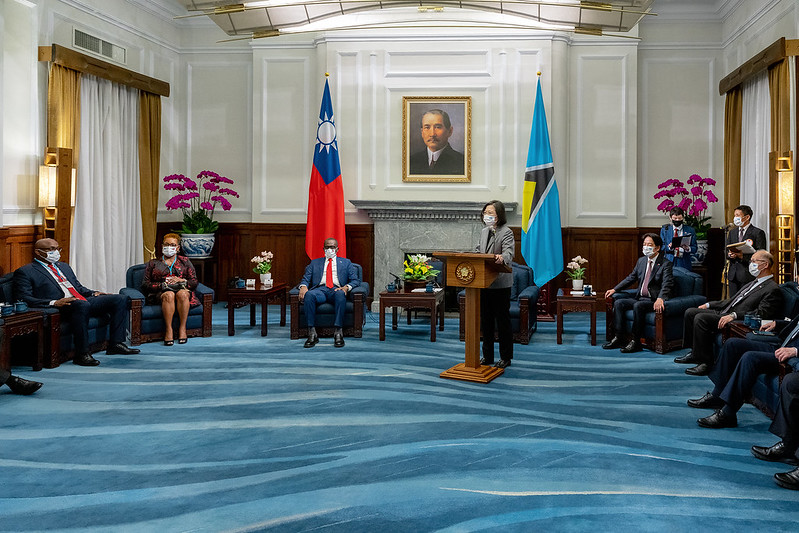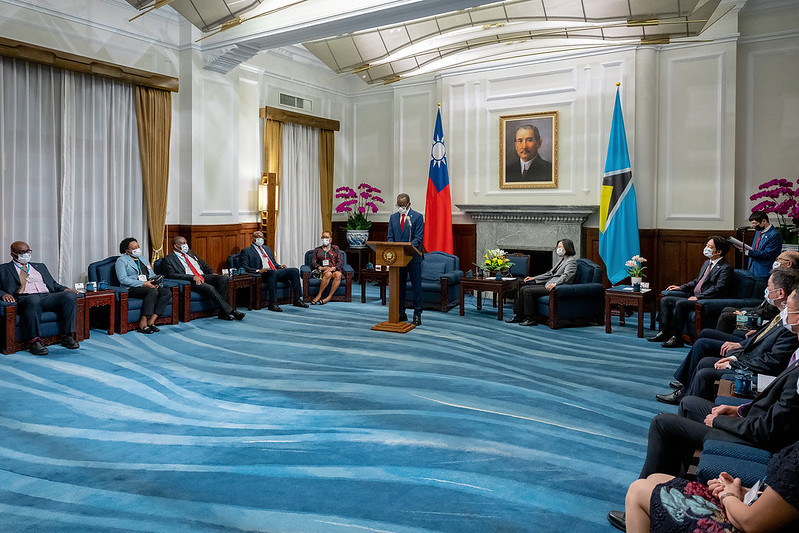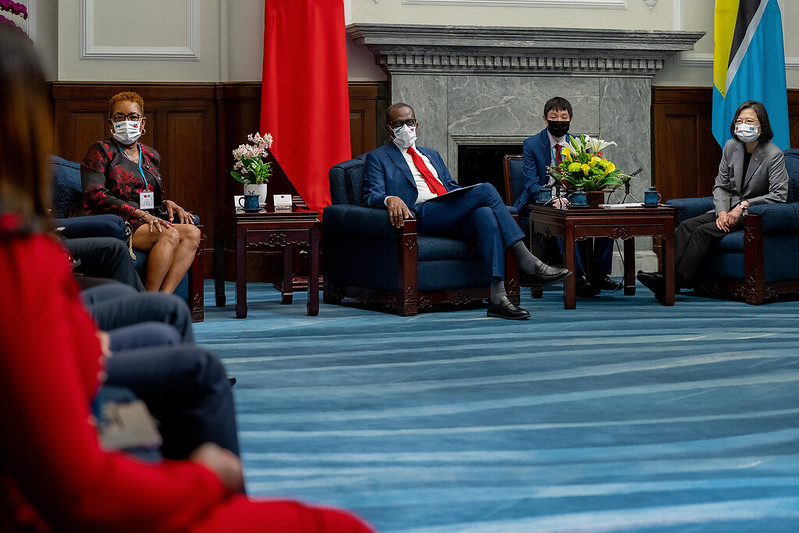News & activities
 News releases
News releases
On the morning of November 29, after welcoming Prime Minister Philip J. Pierre of Saint Lucia and Ms. Marie Felix with military honors, President Tsai Ing-wen, accompanied by Vice President Lai Ching-te, met with Prime Minister Pierre for bilateral talks. In remarks at their meeting, President Tsai thanked Saint Lucia for its longstanding advocacy at international venues for Taiwan's right to participate in global affairs. The president expressed confidence that we will continue to deepen our bilateral partnership by advancing mutual assistance for mutual benefit, while creating even more opportunities for cooperation to bring about greater prosperity for our peoples.
A translation of President Tsai's remarks follows:
It is wonderful to see Prime Minister Pierre back in Taiwan for the first time in 10 years. He is also visiting for the first time in his capacity as prime minister, which adds significance to this occasion. On behalf of the people of Taiwan, I once again welcome Prime Minister Pierre and his delegation.
Taiwan and Saint Lucia are steadfast partners. In recent years, we have initiated cooperation in important areas including infrastructure, fruit and vegetable production and sales, information and communications technology education, medicine, and public health, achieving fruitful results.
I know that Prime Minister Pierre is focused on improving the vocational skills of young people and women to help them achieve their entrepreneurial ambitions. I am delighted that we are also jointly promoting many key cooperation programs in this area.
Prime Minister Pierre's other priority issues include post-pandemic economic recovery, public health and medicine, and sustainable development. He has participated in the United Nations General Assembly for two consecutive years and chairs both the Caribbean Development Bank and the Monetary Council of the Eastern Caribbean Central Bank. It is clear that he is a highly influential leader in the region. Here, I would like to express my admiration for Prime Minister Pierre.
This August, Taiwan, the United States, and Saint Lucia cohosted a workshop on post-pandemic economic recovery in Saint Lucia under the Global Cooperation and Training Framework. Participants shared their successful experiences in promoting the economic empowerment of women and young people. Through exchanges like this, I believe that we can jointly accelerate post-pandemic economic recovery and revitalization.
Confronted by authoritarian expansion, democratic partners must work together in solidarity and bolster the strength of our alliance. I want to especially thank Saint Lucia for its longstanding advocacy on the global stage for Taiwan's right to international participation.
At the General Debate of the 77th United Nations General Assembly this year, Prime Minister Pierre strongly defended Taiwan's international participation. Also this year, at COP27, Minister for Education, Sustainable Development, Innovation, Science, Technology, and Vocational Training Shawn A. Edward, who is here today, ardently voiced his support for Taiwan. The people of Taiwan have been deeply touched by your steadfast friendship, and I would like to once again extend my sincere gratitude to Prime Minister Pierre and his cabinet.
Going forward, I firmly believe that Taiwan and Saint Lucia will continue to deepen our partnership by providing mutual assistance for mutual benefit. I trust that the signing of the Taiwan-Saint Lucia Technical Cooperation Framework Agreement will bring about even more opportunities for cooperation and advance the prosperity of our peoples.
Prime Minister Pierre then delivered remarks and conveyed the best wishes of his government and people to President Tsai and to the government and people of Taiwan. He added that he and his delegation are profoundly honored to take part in this state visit and thanked President Tsai for her warm welcome and gracious hospitality. Visits such as these, the prime minister said, provide him and his delegation with an opportunity to reflect on the beauty of Taiwan, the resilience, vibrancy, and discipline of its people, and the importance of the friendship between our countries.
Looking to the future, Prime Minister Pierre expressed confidence that our shared values and interests will continue to unite us. He stated that this visit is an occasion to celebrate our alliance, which has helped us engender a greater sense of security among nations and enhance the prosperity of both of our peoples, and expressed his belief that this alliance will endure.
Prime Minister Pierre noted that the global challenges we face today are vastly different to those we faced 15 years ago when we resumed diplomatic relations, adding that the effects of pandemics, wars, and climate change are all causing us to reexamine our paths and seek new solutions.
The prime minister expressed his fervent belief that only by working together will our countries and the existing generations be able to tackle some of the greatest challenges of our times. He emphasized that we must find and implement practical solutions to the many threats we face.
Prime Minister Pierre stated that his country will, at every opportunity, reaffirm its belief in respecting national territorial integrity, observing international rules on the peaceful settlement of disputes, and non-interference in the internal affairs of other countries. He said that, as such, his country will continue to champion and support Taiwan's meaningful participation in the organs and agencies of the United Nations and other international organizations.
Prime Minister Pierre expressed his gratitude for Taiwan's continued support and said he looks forward to even greater support for Saint Lucia's national development goals, which cover areas including education, agriculture, the youth economy, housing assistance, digital transformation, and crime management systems. He concluded by thanking the government and people of Taiwan for their support and wished our nations an enduring friendship.
The visiting delegation also included Chair of the Board of the National Insurance Corporation Evaristus Jn Marie, Chair of the Board of the Saint Lucia Development Bank Daryl Raymond, and Press Secretary to the Prime Minister Maundy Lewis, and was accompanied to the Presidential Office by Saint Lucia Ambassador Robert Kennedy Lewis.












